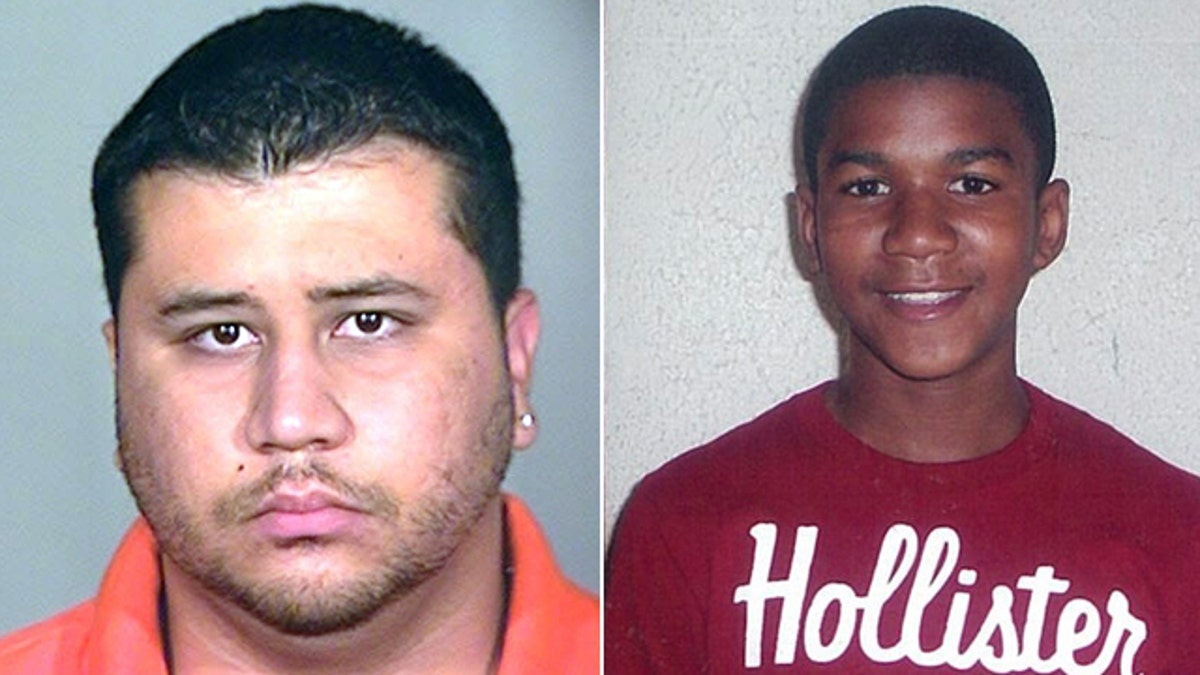
George Zimmerman, left, confronted Trayvon Martin late last month that lead to a shooting that sparked a heated race debate. (AP)
At demonstrations around the country people cry out for justice and even revenge for the killing of Trayvon Martin, an unarmed 17-year-old by a Sanford, Fla. neighborhood watchman named George Zimmerman. They claim Zimmerman was a racist and that led to Martin’s death.
But what if hundreds of Americans got it wrong and Zimmerman isn’t a racist? What if his real motivations were power, control, significance, meaning and recognition? What if that is what ultimately fueled the tragic death of Trayvon Martin?
Let me be clear, I have never met George Zimmerman. My analysis of his mental state is based on my experience and expertise in human behavior and the public information revealed in news reports. But I believe that much of the analysis attributing Zimmerman’s motives purely to race are not correct and miss some important points in this case.
Let me also state clearly, that we, the public, still do not know all the facts surrounding the killing of this 17-year old, who was walking back from a convenience store when he was noticed by the 28-year old neighborhood watchman.
One thing we do know is that Zimmerman called 911 and said this about Martin: “Something's wrong with him…Yep. He's coming to check me out. He's got something in his hands." Zimmerman went on to claim that the teen started to run and that Zimmerman was following the boy; the dispatcher told him, "We don't need you to do that."
Clearly, Zimmerman became the aggressor and the hunter.
But why?
What motivated Zimmerman to chase a young man he believed to be suspicious? Was it really racism or a combination of anger, ego, a desire for power, control or recognition? Was Zimmerman trying to be the community hero, protecting the people?
A personal feeling of “significance” is one of the six key human emotional needs that matter to all of us.
When a person believes that he or she lacks significance, feeling powerless or invisible, he turns to extreme measures to be noticed, to feel powerful and meaningful and to standout.
In a quest for significance, some people will paint their body with lots of tattoos, some will have more and more plastic surgery, others will strive to amass lots of money and others will turn to violence, possibly using guns.
Some young people with few resources and little education will try to gain instant recognition or significance status and power by brandishing a gun and turning to violence.
The desire to become famous, to appear on television, in movies or on stage can often stem from the same need – the need to feel important, special or powerful.
Zimmerman may have been motivated by a desire for power, control, significance and validation within his community.
If he was dissatisfied or felt powerless in his personal life, he might have been seeking power and significance outside of his home with his role and self-given identity as volunteer neighborhood watchman.
But Zimmerman may have also craved power on a grander scale; according to published reports he wanted to become a law enforcement officer - he had even taken a 14-week class at the Seminole County Sheriff's Office.
Zimmerman may also have been ruled by his own strict moral code – reports say that his father was a very strict man. He may possibly have been the same and even more judgmental – adhering and wanting to enforce laws, rules and regulations as well as punish wrongdoers.
In a voice mail he left for another neighborhood watchman, Zimmerman mentioned he wanted to do the right thing and how tough that is to do. But he was also more than protective, he was territorial and controlling: published reports say he had called the police department over 46 times since 2004 to report everything from open garages to suspicious people.
And although, Zimmerman’s attorney claims that his client and his wife had mentored two black children for free (presumably revealing a more compassionate side), there is also a possibility that Zimmerman suffered from repressed anger.
In 2005, his ex-fiancée Veronica Zuazo, filed a civil motion for a restraining order alleging domestic violence. Both Zimmerman and Zuazo were granted restraining orders against each other.
Also in 2005, Zimmerman, who was only 20 years old at the time, was arrested and charged with “resisting officer with violence” and “battery of law enforcement officer”; the charge was reduced to “resisting officer without violence” and later waived when he entered an alcohol education program.
Just 4 years before that, in 2001, at about age 17, Zimmerman was the victim of a minor criminal assault. And although the details of the crime are unknown to the public, it may also explain the choice he made, of his own accord to pursue Martin, and against the directive by the 911 dispatcher. With this decision, he revealed his ego and anger and possibly the corruption of power and responsibility he had been given.
On the night of Martin’s death did Zimmerman believe he had total dominion over his gated community? Did he believe that he could enforce the law, judge people or pursue them based on his own judgment -- thus ignoring his assigned role as neighborhood watchman?
Americans around the country immediately responded with great emotion to Zimmerman’s actions because they made a judgment based on the color of Zimmerman’s skin -- and Martin’s -- while failing to understand the context, psychological background and history of George Zimmerman.
What they failed to see was not a man motivated by racism but a man who was instead, clearly motivated by anger, ego and a desire for power and control.
Patrick Wanis, Ph.D. is a human behavior exxpert, therapist and author. For more visit his website: PatrickWanis.com.
